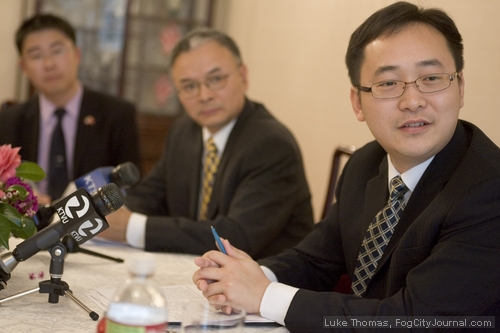
Illustration courtesy NJN Network
March 27, 2010
It is well documented that Google closed down its self-censored mainland Chinese search engine in January, and redirected all its Chinese traffic to its Hong Kong search engine, Google.hk. This left all Internet censorship in China to “the Great Firewall,” the government-controlled censor which blocks illegal content.
In a statement, Google stated the reason for its move stems, in part, from multiple cyber-attacks it has received originating in China that Google believes was aimed at gathering information on Chinese human rights activists as well as intellectual property. The statement also cites growing Internet censorship.
“We believe this new approach of providing uncensored search in simplified Chinese from Google.com.hk is a sensible solution to the challenges we’ve faced,” said Google Chief Legal Officer David Drummond. “We hope the Chinese government respects our decision though we are aware that it could at any time block access.”
Fog City Journal took the opportunity during a press conference Thursday at the Chinese Consulate in San Francisco to ask the Chinese Consul some important questions about official government policy regarding freedom of information and censorship. We asked the Consul if the allowing of Internet search engines such as Google, despite the restrictions, could be a signal that the Chinese government intends to eventually relax its laws of censorship and freedom of information.
Chinese Consulate spokesperson Zhou Yunliang would not go into specifics on the matter, merely answering that he didn’t think one company could change the policy of a nation.
When further pressed on the matter and asked what are the specific censorship rules that Google felt it could no longer comply with, Mr. Yunliang respond more pointedly: “There is certain content circulating on the Internet which is against Chinese law,” he said.
“According to the reports of some Chinese residents, the (Google) search engine has spread large amounts of vulgar and pornographic content. As a parent, you cannot allow your child to surf the Internet and look at those kinds of things. It is natural for the Chinese government to ban these kinds of practices,” Yunliang continued. “You cannot spread some content which will damage national security and the stability of the society. That is a requirement of the law and regulations.”
 
Chinese Consulate spokesperson Zhou Yunliang (right)
with Chinese Consulate Commercial Counselor Tian Deyou (center).
According to Andrew Loewenstein, whilst researching in China for his book, The Blogging Revolution, he found the constant refrain was to “protect children” from “pornography,” a term that refers to both sexual and political content. (You can find Wikipedia’s list of words and concepts censored by search engines in China here).
Clearly there are many things not permitted by the Chinese government, and one of those things is talking about them.
Mr. Yunliang then countered with the assertion that “there are some cases, according to Chinese media reports, where there have been confrontations with Google, which has not been so glorious as it claims.”
“Google has copied search methods from another Chinese company, Sogou (Sohu), and Google even delayed its payment of tax to the Chinese authorities several years ago,” Mr. Yunliang said. “Several years ago we found a lot of illegal and false policy advertisements in the sponsored links on Google’s web page.”
“Just last year Google was involved in the practice of illegally copying Chinese books, and they are being sued by some Chinese writers. Up to this point these Chinese writers have been urging Google to respond; they are still waiting.”
So it appears that there are grievances on both sides with neither side willing, as yet, to back down from the moral high ground. Mr. Yunliang finished with the statement: “For foreign companies, if they are going to operate in China, they have to obey Chinese laws and regulations. Just as any company operating in America needs to obey US law.”
Despite the restrictions, there are a growing number of Chinese ‘netizens’ who resent being told what they can or can’t view by their goverment. A Chinese reporter told FCJ there are ways of bypassing government censorship through subscription-based service providers. An estimated 400,000 people access a virtual private network that allows “the Great Firewall” to be circumvented. So, in China, it seems you must pay for freedom of information.
A spokesperson for Google said, “The issue for us has always been censorship, and the lack of transparency around removals and take downs in China. We believe that our new approach — serving mainland Chinese users via an uncensored service in simplified Chinese on Google.com.hk — will meaningfully increase access to information for people in China.”
Google’s co-founder Sergey Brin believes efforts by governments such as China to control online speech will ultimately fail, adding: “I think that in the long term, they are going to have to be open.” He recently called on President Obama’s administration to place a “high priority” on fighting Chinese web blocking.

Google co-founder Sergey Brin.


 The Hunger Site
The Hunger Site
No Comments
Comments for Chinese Government Hard Line Stance
on Google Remains Unchanged are now closed.